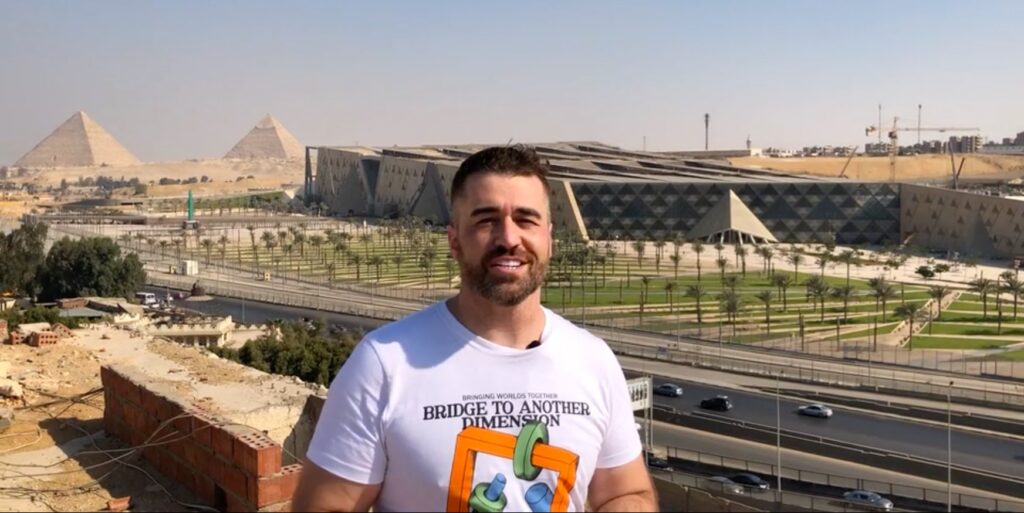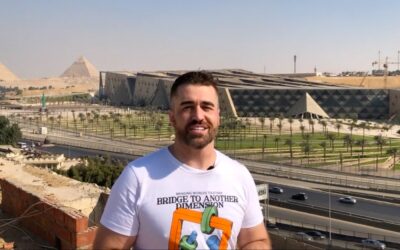
While the government of Egypt is still keeping plans for the opening of the Grand Egyptian Museum a well-guarded state secret, some hints as to their planning and thinking are starting to seep out. Over the summer, we reported that the Ministry of Tourism and Antiquities wants to hold an elaborate multi-day ceremony to mark the opening of the new billion-dollar museum and that it was most likely to be either in or after June of 2022. But now, we can let you in on a little more intel that comes directly from someone who is, if not directly involved himself in the planning, then well-connected to those who are, including the Minister of Tourism and Antiquities.
Dr. Zahi Hawas is known around the world as quite a character in the field of Egyptology (and we mean that in a good way). He frequently appears on television shows, documentaries, and news programs commenting on Egyptian history, archaeology, and new discoveries. He’s a renowned Egyptologist who also served for years as the Secretary-General of the Supreme Council of Antiquities and as Minister of Antiquities. As if that weren’t enough, he has also written an opera about the life of King Tut that is expected to be performed as part of the opening ceremonies for the GEM.
In a brief call-in appearance recently on the Egyptian TV program Al Hayath Al Youm (translation: The Daily Event), Dr. Hawas was asked directly what he knew about the opening date of the GEM. While he didn’t confirm a date, he suggested that November 4th, 2022 would be an ideal date for such an event given the connection and significance of that date as the 100th anniversary of the discovery of King Tut’s tomb. He also mentioned a connection to the 200th anniversary of the deciphering of the Rosetta Stone, which was technically on September 27th, 1822, although he focused more on the November 4th date in the interview.
The original Arabic broadcast of the interview is embedded below, followed by an Egypt Travel Blog transcription and translation of the interview from Arabic into English.
Interview Translation by Egypt Travel Blog:
Said Ali (Interviewer): In the name of Allah, the most merciful, I am returning with an interview with mister Zahi Hawas. He was talking about the interest of the Egyptian state in ancient archaeological sites. This is reflected in the reputation of Egypt greatly, especially as we know the extent of people’s passion when they hear the word “Egypt” or anything related to the ancient Egyptian antiquities, which represent the passion of many. That is why I always say that Egypt has a commodity that no one can compete with. Therefore, we want to increase reliance on antiquities in tourism, whether Roman, Islamic, or Coptic. I always give the example of the place in which our Lord Almighty transfigured to speak to Moses [Mount Siani], which can attract Christians, Muslims, Jews, and others. These people want to see the place where the Lord was revealed, which is an unbeatable commodity. To be honest, the Minister of Tourism and Antiquities is working hard. And here is someone else who works hard in this field as a passion, Dr. Zahi Hawass. Welcome.
Zahi Hawass (Interviewee): Hello, Mr. Said.
Said Ali (Interviewer): How are you? And how is your health?
Zahi Hawass (Interviewee): Thank god, everything is alright.
Said Ali (Interviewer): You say that Egypt’s interest in antiquities will attract different tourists. Is this new? People have always had a passion for ancient Egyptian antiquities.
Zahi Hawass (Interviewee): Of course, the passion is growing. Last night I was giving a lecture to a group of Americans. They told me that they met the Minister of Tourism and Antiquities. I asked them, “Where did you meet him?”. There was an opening of a cemetery called the Southern Cemetery last night. This tomb belongs to King Djoser. I started restoring and saving this cemetery, but the restoration process stopped after the events of 2011. But Dr. Khaled Al-Anani started restoring it again five years ago, and he finished and opened it last night. These tourists visited the cemetery with Dr. Khaled. Going down the graveyard was tricky and dangerous, but it was an exciting adventure. These kinds of adventures undoubtedly have a significant impact on the world. The world now cares that the Egyptian government and its president, Abdel Fattah el-Sisi, have a particular interest in historic Cairo, Islamic Cairo, the areas around the National Museum of Egyptian Civilization and the Grand Egyptian Museum. I can’t wait for the museum to open next year and for the Pyramids and Rams Road areas to be developed. There is an archaeological renaissance happening about which I am very proud and delighted. The whole world is interested in this development. I was in America for the entire month of August, and I held lectures for the first time after the pandemic crisis. The week before, I was in another country. Everyone is talking about the Grand Egyptian Museum and how the Egyptian state spent more than a billion dollars on it. This is proof that we, as a country, care about our monuments even before any other development.
Said Ali (Interviewer): How can we use this in tourism?
Zahi Hawass (Interviewee): The problem we are currently facing is the Corona crisis. However, many tourists still visit us. I was giving a lecture to 23 Americans last night. After the Corona crisis subsides in the European countries, you will find tourists from countries such as Italy and Germany will come. This is a result of the considerable promotion that the Ministry of Antiquities is doing for tourism.
Said Ali (Interviewer): Can we take advantage of this period to develop our tourism infrastructure, for example, around other sites such as those related to the journey of the Holy Family in Egypt? We can develop infrastructure for an integrated tourism industry.
Zahi Hawass (Interviewee): This is already happening. Dr. Khaled El-Anany told me that the sites visited by our Lord Jesus Christ are already being developed. Munir Ghabor is already set in Mataria in the Mariam Tree District. This is already developed. As you said in the past, Egypt is a country that links religions and has hosted great civilizations like no other place has witnessed. If you meet an 8-year-old in any country around the world and say the word “Egypt” to him, he will tell you about the pyramids, the Sphinx, the mummies, and Tutankhamun. I agree with you. This is what Dr. Khaled is actually doing. He is now developing the areas for the Holy Family’s journey so that Christians can visit these holy sites in Egypt.
Said Ali (Interviewer): When is the Grand Egyptian Museum opening next year?
Zahi Hawass (Interviewee): I think it will be on a day that has significance, such as November 4, 2022, which is the 100th anniversary of the discovery of Tutankhamun’s tomb. I held today’s meeting based on a call from Dr. Khaled El-Anany because we are arranging to celebrate this day. So if it happens like this, it will be a global and historic event.
Said Ali (Interviewer): November 4, 2022, in the memory of what?
Zahi Hawass (Interviewee): The 100th anniversary of the discovery of King Tutankhamun’s tomb.
Said Ali (Interviewer): That’s a very important proposal and I hope things calm down so that invitations will be sent to celebrities, leaders and global stars.
Zahi Hawass (Interviewee): We will also celebrate the deciphering of the hieroglyph language then.
Said Ali (Interviewer): Deciphering hieroglyphs and the Rosetta Stone. This is a critical piece as well. I hope your invitations find acceptance, and I believe they will. Thank you so much. The great Egyptian scientist, Dr. Zahi Hawass.




